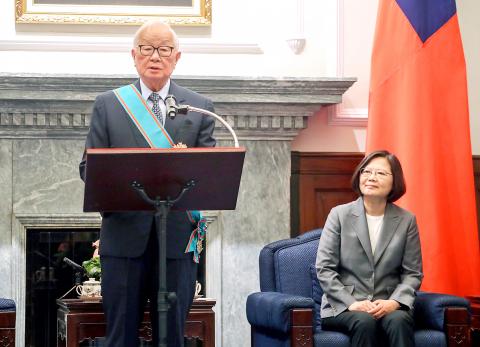President Tsai Ing-wen (蔡英文) yesterday awarded Taiwan Semiconductor Manufacturing Co (TSMC) founder Morris Chang (張忠謀) the Order of Propitious Clouds, First Class.
At the ceremony, Tsai said the medal was for the tech guru’s contribution to Taiwan’s IC industry, as well as the development of the local high-tech sector.
The Order of Propitious Clouds is awarded to civil servants who have made great contributions to the nation and to civilians and foreigners for outstanding civic merit.

Photo: CNA
Chang is the first person from the business sector to receive the Order of Propitious Clouds, First Class.
Tsai said she greatly respected Chang and considered him a good friend, adding that she often asks him for advice on how to promote national policies and has learned a lot from the TSMC founder.
Chang brought advanced IC know-how to Taiwan from the US, where he received a master’s degree from the Massachusetts Institute of Technology and a doctorate from Stanford University, helping Taiwan build a comprehensive IC industry incorporating upstream and downstream sectors, she said.
In 1985, the government recruited Chang to run the Industrial Technology Research Institute, a decision that perhaps altered the course of science and technology in Taiwan forever, Tsai said.
As head of the institute, Chang was in charge of promoting industrial and technological development in Taiwan. He combined his experience working in the semiconductor industry with a rising trend of outsourcing to found TSMC.
Since its establishment in 1987, TSMC has become the world’s leading semiconductor foundry, commanding a global market share of more than 50 percent.
TSMC has continued to developed critical IC technology in Taiwan, Tsai said, a reference to the company’s plan to build a sophisticated 3-nanometer process wafer fab in Tainan, which is expected to serve as a hub to supply chips for cloud-computing and artificial intelligence applications, as well as 5G devices.
Addressing the ceremony, Chang, who in June retired as chairman of TSMC after serving with the company for more than 30 years, said the world’s largest contract chipmaker is a very successful company, but it also faces stiff competition from firms in several countries such as the US, China and Japan, which have been motivated by rising nationalism.
Amid escalating statism, TSMC needs fair competition in order to grow, he said.
In addition to international competition, the local IC industry also faces a shortage of resources, including land, water, electricity and talent, Chang said, urging the government to give the tech sector the support it needs to prosper.
Chang said he has faith in TSMC’s new leadership and expects the company to expand and make more contributions to the nation.
In June, Mark Liu (劉德音) succeeded Chang as chairman of the company’s board and C.C. Wei (魏哲家) has served as TSMC’s vice chairman and CEO, establishing a dual leadership system.

A preclearance service to facilitate entry for people traveling to select airports in Japan would be available from Thursday next week to Feb. 25 at Taiwan Taoyuan International Airport, Taoyuan International Airport Corp (TIAC) said on Tuesday. The service was first made available to Taiwanese travelers throughout the winter vacation of 2024 and during the Lunar New Year holiday. In addition to flights to the Japanese cities of Hakodate, Asahikawa, Akita, Sendai, Niigata, Okayama, Takamatsu, Kumamoto and Kagoshima, the service would be available to travelers to Kobe and Oita. The service can be accessed by passengers of 15 flight routes operated by

Alain Robert, known as the "French Spider-Man," praised Alex Honnold as exceptionally well-prepared after the US climber completed a free solo ascent of Taipei 101 yesterday. Robert said Honnold's ascent of the 508m-tall skyscraper in just more than one-and-a-half hours without using safety ropes or equipment was a remarkable achievement. "This is my life," he said in an interview conducted in French, adding that he liked the feeling of being "on the edge of danger." The 63-year-old Frenchman climbed Taipei 101 using ropes in December 2004, taking about four hours to reach the top. On a one-to-10 scale of difficulty, Robert said Taipei 101

Taiwanese and US defense groups are collaborating to introduce deployable, semi-autonomous manufacturing systems for drones and components in a boost to the nation’s supply chain resilience. Taiwan’s G-Tech Optroelectronics Corp subsidiary GTOC and the US’ Aerkomm Inc on Friday announced an agreement with fellow US-based Firestorm Lab to adopt the latter’s xCell, a technology featuring 3D printers fitted in 6.1m container units. The systems enable aerial platforms and parts to be produced in high volumes from dispersed nodes capable of rapid redeployment, to minimize the risk of enemy strikes and to meet field requirements, they said. Firestorm chief technology officer Ian Muceus said

MORE FALL: An investigation into one of Xi’s key cronies, part of a broader ‘anti-corruption’ drive, indicates that he might have a deep distrust in the military, an expert said China’s latest military purge underscores systemic risks in its shift from collective leadership to sole rule under Chinese President Xi Jinping (習近平), and could disrupt its chain of command and military capabilities, a national security official said yesterday. If decisionmaking within the Chinese Communist Party has become “irrational” under one-man rule, the Taiwan Strait and the regional situation must be approached with extreme caution, given unforeseen risks, they added. The anonymous official made the remarks as China’s Central Military Commission Vice Chairman Zhang Youxia (張又俠) and Joint Staff Department Chief of Staff Liu Zhenli (劉振立) were reportedly being investigated for suspected “serious